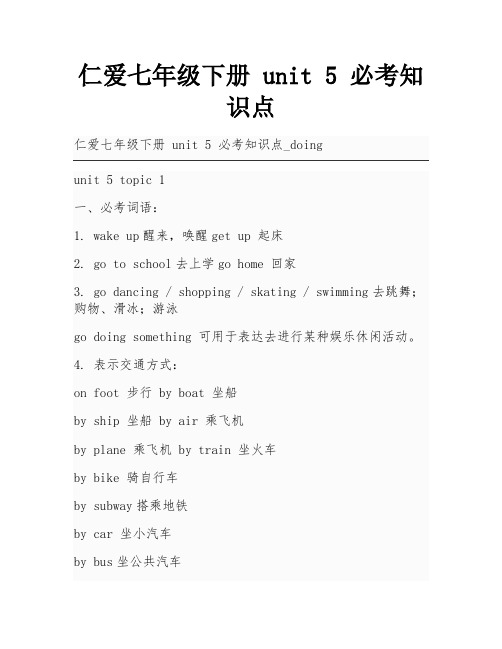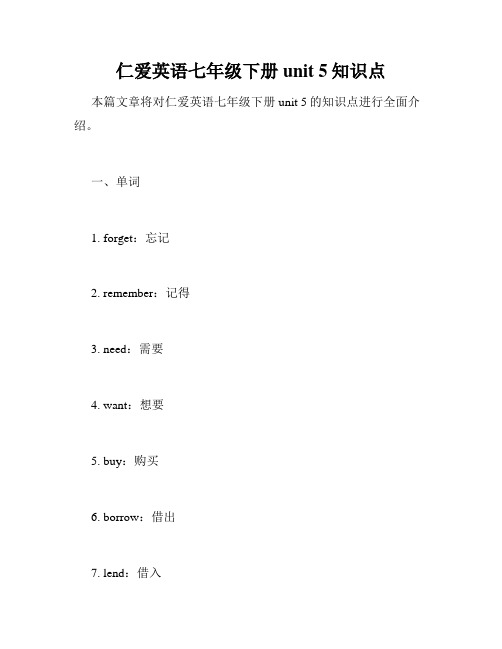仁爱版英语七年级下册Unit5Topic1知识点
仁爱七年级下册 unit 5 必考知识点

仁爱七年级下册 unit 5 必考知识点unit 5 topic 1一、必考词语:1. wake up醒来,唤醒get up 起床2. go to school去上学go home 回家3. go dancing / shopping / skating / swimming去跳舞;购物、滑冰;游泳go doing something 可用于表达去进行某种娱乐休闲活动。
4. 表示交通方式:on foot 步行 by boat 坐船by ship 坐船 by air 乘飞机by plane 乘飞机 by train 坐火车by bike 骑自行车by subway搭乘地铁by car 坐小汽车by bus坐公共汽车5. take the subway / bus / car搭乘地铁;公共汽车;小汽车6. drive a car to work = go to work by car驾车去上班take a bus to work = go to work by bus 乘公共汽车去上班go to school on foot = walk to school步行去上学7. ride a bike / horse骑自行车;骑马8. after school / class放学以后;下课以后9. play the piano / guitar/ violin弹钢琴;吉他;小提琴play basketball / soccer / football 打篮球;踢足球;打橄榄球play puter games玩电脑游戏play with a puter 玩电脑 play sports 做运动10. next to紧挨着,在…旁边11. on weekdays在工作日 at weekends在周末12. have breakfast / lunch / supper / dinner / meals 吃早餐;中餐;晚餐;正餐;一日三餐have classes / lessons / a meeting上课;上课;开会13. watch tv / movies / games / the animals看电视;电影;比赛;动物read novels / newspapers / books看小说;报纸;书14. wash one’s face / clothes洗脸;衣服15. 反义词:up – down, early – late近义词:quickly– fastget up early 早起 be late for 迟到16 表示建筑物(尤其学校建筑物):on the playground在操场 at school / home / table学校;家里;桌旁in a puter room / teachers’ office / classroombuilding / gym / library / lab / canteen在电脑室;教师办公室;教学楼;体操馆;图书馆;实验室;食堂17. around six o’clock = at about six o’clock大约在六点18. 频率副词:never, seldom, sometimes, often, usually, always重点详解1.i always e to school by bus.by+交通工具名称,表示使用某种交通方式,中间不加限定词,如果交通工具前有a, the, my 等限定词,就不能用by,而是用in或是on.on the train=by train on his bike=by bike in my car=by car.巧辩异同on foot 与 walkon foot “走路”,是介词短语,不能作谓语,只作方式状语,位于句末。
仁爱英语七年级Unit5Topic1重点归纳

Unit5 Topic1重点归纳1.by+交通工具单数名词,中间不加限定词,表示乘坐某种交通工具,在句子中作方式状语,放于句末。
2.表示乘坐某种交通工具,有以下四种表达:(1)by+交通工具;(2)take a/the+交通工具;(3)in/on+a/the+交通工具;(4)walk/ride/drive/fly to+地点名词3. go to school by bus/on a bus =take a bus to school坐公共汽车去学校4. go to school on foot=walk to school步行去学校5. go to the zoo by car/in one’s car=drive to the zoo开车去动物园6. go to Beijing by plane=fly to Beijing坐飞机去北京7. 频度副词always, usually, often, sometimes, seldom, never置于行为动词前,be动词、情态动词和助动词之后。
8. It’s time for (doing) sth.=It’s time to do sth. 该做某事的时间了9. 对方式提问用How(怎样);对频率提问用How often(多久一次);对具体的时间提问用What time(什么时候/几点钟),常用at+“具体时间”回答。
10.do one’s homework 做家庭作业11.for a short time一会儿12.know about/of sth. 了解……的情况13.be over结束14.in one’s free/spare time 在某人的空闲/业余时间15. 辨析:watch/look/seewatch强调聚精会神地看,常指看动态的食物;look强调看的动作,后接宾语时加at再加宾语;see 强调看的结果,表示看见某物。
e on加油17.on weekdays在工作日18.watch TV看电视19.would like/want to do sth.想做某事。
七年级英语(仁爱版)下册 Unit-5-Topic-1 知识点总结语言点归纳

知识点七年级英语(仁爱版)下册Unit-5-Topic-1语言点归纳Unit 5 Topic 1I 重点词汇和短语gate, by, always, plane, train, ship, boat, Ms., grandmother, group, weekday, early, bird, catch, seldom, walk, never, sometimes, ride, park, watch, TV, homework, life, American, or, few, day, rest, play, basketball, swim, ball, game, read, listen, library, once, twice, week, every, must, first, music, begin, while, wall, bed.the same to, come on, on foot, by plane, know about, for a while, watch TV, do (one’s) homework, have lunch, at school, have a rest, be different from, go swimming, listen to, go to bed, go to school, have classes.II 语言点Section A1. a) ---Happy New Year! ---- The same to you! / You, too. 新年快乐!也祝你新年快乐!b) ----Happy birthday! -----Thank you! 生日快乐!谢谢!2. How about you? = What about you? 你怎么样?3. Oh, your new bike looks very nice! 哦,你的新自行车看起来很好看。
仁爱英语七年级下册Unit 5 知识点

仁爱英语七年级下册unit 5知识点本篇文章将对仁爱英语七年级下册unit 5的知识点进行全面介绍。
一、单词1. forget:忘记2. remember:记得3. need:需要4. want:想要5. buy:购买6. borrow:借出7. lend:借入8. pay:支付9. cost:花费10. heavy:重的11. light:轻的12. thin:薄的13. thick:厚的14. long:长的15. short:短的16. small:小的17. big:大的18. hot:热的19. cold:冷的二、语法1. 情态动词情态动词包括can/could, may/might, must, should/ought to等,用于表示说话人的态度、意愿、可能性、推测等。
比如:I can swim.(我会游泳。
)You must finish your homework.(你必须完成作业。
)2. 定冠词和不定冠词定冠词the用于特指某一事物,比如the book(那本书);不定冠词a/an用于泛指某一个,比如an apple(一个苹果)。
3. 物主代词我、你、他、她、它等人称代词后面加上我的、你的、他的、她的、它的等词,就构成了物主代词。
比如:I lost my bag.(我丢了我的书包。
)4. 名词的复数在名词后面加-s或-es来表示复数形式,比如books(书)、boxes(箱子)。
5. 副词副词是用来修饰动词、形容词、副词和句子的。
常用的副词有often, always, sometimes等。
6. 数词数词是用来表示数目、数量的词语。
基数词表示数量,比如one(1)、two(2)等;序数词表示顺序,比如first(第一)、second(第二)等。
三、阅读理解这个单元包含了一篇短文,提供了购物建议。
阅读理解是考查学生字义理解能力的一种方式,要求同学们读懂短文,并理解其内容。
四、写作技能写作技能涉及到学生组织语言,进行人际交流的能力。
2015 最新仁爱英语七年级下册各话题单词 Unit 5 Topic 1

Unit 5 Topic 1gate n. 大门by prep. (表示方式,如乘车等);按照subway(underground)n. 地铁always adv. 总是,一直come on快点儿;加油;来吧on foot步行plane n. 飞机train n. 火车v. 培训,训练ship n.(大)船,轮船boat n. 小船,小舟weekday n.工作日early adj. 早的adv.早地bird n.鸟catch v.捉住;接住;赶上;染上(疾病)worm n.软体虫,蠕虫(尤指蚯蚓)sometimes adv. 有时seldom adv.很少walk v.& n.步行;散步never adv.从不ride v. 骑(自行车、马等)park n. 公园v.停(车)watch v.观看;当心n.手表,表TV = television n.电视watch TV看电视soccer(football)n.足球(运动)movie (film) n.电影begin v.开始at school在学校;在上课after prep.在…后bed n.床basketball n.篮球swim v.& n.游;游泳listen v.(注意地)听……listen to v.(注意地)听……music n.音乐library n.图书馆week n. 星期,周once adv.一次;曾经conj.一旦twice adv.两次;两倍great adj.伟大的;好极的wall n. 墙the Great Wall 长城life n.生活;生命American adj.美国的;美国人的n. 美国人or conj.还是,或;否则over adv.结束;穿过;多于prep. 在…上面more det.更多的adv.更多talk v.& n.谈话。
2020年春仁爱版英语七年级下册词组及重点句型

2020年春仁爱版英语七年级下册词组及重点句型Unit5 Topic 1e/go to school 去上学at the school gate 在校门口2. ride a/the/one’s bike to ……sw by biketake a/the bus to …….. sw by bustake a/the ship to …….. sw by shiptake a/the boat to ……..sw by boat动词take a/the plane to ……..sw go/come to…sw by plane= by air take a/the train to ……..sw by traintake a/the subway to ……..sw by subwaydrive a/the/one’s car to ……..sw by carwalk to ……..sw on foote on 加油,赶快4.get up起床5. on weekdays /on weekends 在工作日/在周末6.do one’s (my/ his /her/our/their….) homework做家庭作业7.watch TV看电视8.in the morning/afternoon/evening在早上/下午/晚上9.play basketball/soccer/ping-pong打篮球/踢足球/打乒乓球10.see a movie看电影11.have breakfast/lunch/dinner 吃早饭/午饭/晚饭12.have four classes上四节课13.after school/class/dinner 放学后/下课后/晚饭后14. get to….到达get home到家15.go to bed 去睡觉16.go shopping/swimming/fishing 去购物/游泳/钓鱼17.listen to music 听音乐18.go to the zoo/library/park 去动物园/图书馆/公园19.meet friends 会见朋友20.read books 读书21.once/ twice a week一周一次/两次22.three times a week 一周三次23.very often很经常24. know about 了解25. the school life校园生活26. in one’s free time 在某人空闲时27. for a short time 一小会儿重点句型1.Happy New Year! 新年快乐!The same to you. 你也一样。
仁爱版英语七年级下册 Unit5_Topic1_短语句型归纳
Unit5 Topic1 短语句型归纳【短语集萃】the same to对……也一样come on快点儿;加油;来吧on foot走路,步行go to school 去上学on weekdays 在平日do (one’s) homework 做家庭作业watch TV 看电视at school在学校;在上课go to bed睡觉play basketball打篮球go swimming 去游泳listen to 听once a week 每周一次have lunch 吃午饭in one’s free time 在某人的业余时间the Great Wall 长城have classes 上课talk to 和……交谈be different from与……不同【典句必背】1. —Happy New Year! 新年快乐!—The same to you. 也祝你新年快乐!2. —How do you usually come to school? 你通常怎样来学校?—I usually come to school by subway.我通常乘地铁来学校。
3. Oh, it’s time for class. Come on! 噢,上课时间到了。
快点!4. —Michael, what time do you usually get up on weekdays? 迈克尔,你平日通常几点起床?—I always get up at about six o’cl ock. 我总是6点左右起床。
5. The early bird catches the worm. 早起的鸟儿有虫吃。
6. Maria sometimes takes the subway home. 玛利亚有时候乘地铁回家。
7. 一How often do you come to the library? 你多久来一次图书馆?—Three times a week.一周三次。
+Unit+5+Topic+1+Section+D 仁爱版七年级英语下册
Grammar 语法
Adverbs of Frequency 频度副词 我从不乘地铁来学校。 I _n_e_v_e_r_ come to school by subway. 我很少走路去上学。 I _s_e_ld_o_m_ walk to school. 玛瑞亚有时乘地铁回家。Maria _s_o_m__e_ti_m__e_s takes the subway home. 李想经常骑自行车去上学。 Li Xiang _o_f_t_e_n_ rides a bike to school. 我们通常步行去公园。 We _u_s_u_a_l_ly_go to the park on foot. 他们总是乘公交车去动物园。They _a_l_w_a_y_s_ go to the zoo by bus.
…
2. Compare the school life of American students with yours and report it to the class.
Chinese Students
American Students
3. Write a passage. You may use the expressions in Functions if necessary.
Interviewer: Where do they usually have lunch?
Michael: They usually have lunch at school and
then begin class at about one o’clock in the
afternoon.
be over 结束
Project
1. Survey your classmates about their school life.
仁爱版七年级英语下册unit5知识点
仁爱版七年级英语下册unit5知识点Unit 5是本学期英语教材的重点单元,内容包括了商店购物、邮局服务、家庭家务等日常话题,涵盖了丰富的生活场景。
以下是本单元的知识要点:一、词汇1.商店购物shoes shoes store shirt shirt store dress dress storepants pants store skirt skirt store hat hat storecoat coat store book bookstore bag bag storebank bank card credit card cash change2.邮局服务post card letter envelope stamppost office mailbox address zip code3.家庭家务clean clean up sweep mopwash laundry fold drydish do the dishes set the table clear the table二、重点语法本单元的语法重点是一般现在时和there be句型的运用。
1.一般现在时一般现在时通常用来表示反复发生的动作、习惯性的行为或者现在的状态。
它的构成方式是主语+动词原形+其他。
注意第三人称单数形式应该在动词后面加上“s”。
例如:I often go shopping on weekends. (我经常在周末去购物。
)She always buys books in the bookstore. (她总是在书店买书。
)2.there be句型there be句型用来表示某地或某处有某物。
当表示单数或者不可数名词时,应该用there is;当表示复数名词时,应该用there are。
例如:There is a bank in front of the bookstore. (书店前面有一家银行。
)There are some chairs in the classroom. (教室里有一些椅子。
仁爱英语七年级下五单元topic1 知识点
Unit5 Our School LifeTopic1 I usually come to school by subway Section A一.背一背1.Happy new year! 新年快乐!2.at the school gate 在学校门口3.The same to you. 你也是。
4.Nice to see you again. 再次见面很高兴。
5.by bike 骑自行车6.by subway=by underground坐地铁7.You’re right. 你说得对。
8.How about you? 你呢?e on! 快点;加油10.on foot 步行二.金点剖析1. --Happy new year! 新年快乐!-- The same to you. 你也一样.【记一记】:【考一考】--Merry Chrismas!-- _____________. (回答)2. Oh, your new bike looks very nice! 你的新车看起来很漂亮!【记一记】:拓展:look ____ 看look ____ 看上去像look ____ 照看【考一考】1. Ann’s mother is not at home. So Ann has to _________ her sister.2.Jim _______ his father. They both(都) have small eyes.3. Please _______ the photo! It’s wonderful.4. Your dress _____ very nice. May I have a look?A. watchB.seesC. looksD. shows3.--How do you usually come to school? 你平时怎么去上学?-- I usually come to school by subway.【记一记】:注意:① by,on, in 引导的短语在句中只能作状语,与go,come,get等连用。
- 1、下载文档前请自行甄别文档内容的完整性,平台不提供额外的编辑、内容补充、找答案等附加服务。
- 2、"仅部分预览"的文档,不可在线预览部分如存在完整性等问题,可反馈申请退款(可完整预览的文档不适用该条件!)。
- 3、如文档侵犯您的权益,请联系客服反馈,我们会尽快为您处理(人工客服工作时间:9:00-18:30)。
Unit 5 Topic 1
重点语法一般现在时(常与频度副词never, seldom, sometimes, often, usually, always等连用)
重点句型—How do you usually come to school?
—I usually come to school by subway.
—How often do you go to the library?
—Once/Twice/Three times a week/Very often/Every day/Seldom 重点详解
1. I always come to school by bus.
by+交通工具名称,表示使用某种交通方式,中间不加限定词,如果交通工具前有a, the, my 等限定词,就不能用by,而是用in或是on.
on the train=by train on his bike=by bike in my car=by car.
巧辩异同on foot 与walk: on foot “走路”,是介词短语,不能作谓语,只作方式状语,位于句末。
walk “走路”,是动词,可以作谓语。
go to…on foot= walk to
例:I often go to school on foot. =I often walk to school.
同样,go to….by bike = ride a bike to
go to…. by car = drive a car to
go to … by plane = fly to
go to… by bus = t ake a bus to
2 .Come on! It’s time for class. come on “快点,加油,来吧”。
It’s time for sth. “该做某事了”,与It’s time to do sth.意思一样。
3 .look (感官动词) 看起来,后面加形容词
例:They look very cute.
look的短语look the same看起来一样
look like看起来像……
look for寻找look after 照顾
4. do my homework at school 在学校做作业
do one’s homework 做家庭作业(注意:one’s 要随主语的变化而变化,常用形容词性物主代词my, your, their, our, his, her等)。
5.we want to know about the school life of American students. 我们想了解一下美国学生的学校生活。
know about “了解,知道关于…”。
6.巧辩异同 a few与few:a few “一些”,few“很少,几乎没
有”,修饰可数名词。
a little与little:a little“一些”,little“很少,几乎没
有”,修饰不可数名词。
7.They often play basketball or soccer, go swimming and so on.
go swimming 去游泳and so on “等等”,表示还有很多。
拓展:go+v.-ing 表示去做某事,类似的有:
go fishing 去钓鱼go shopping 去买东西
go boating 去划船go skating 去滑冰
8.How often do you go to the library?你多久去一次图书馆?
how often“多久一次”,问频率,答语常用频度副词never, always,often等或单位时间内的次数once a week一周一次、twice a month每月两次、three times a year每年三次
语法讲解一般现在时
一般现在时表示:
(1)现在所处的状态。
Jane is at school.
(2)经常或习惯性的动作。
I often go to school by bus.
(3)主语具备的性格和能力。
He likes playing football.
(4)客观真理。
The earth goes round the sun.
常用的时间状语:often, always, usually, sometimes, every day等等。
行为动词的一般现在时,助动词是do/don’t和does/doesn’t.当主语是第一、二人称和所有复数形式时,行为动词用原形。
肯定式:I go to school on foot.
否定式:I don’t go to school on foot.
疑问式:Do you go to school on foot?
—Yes, I do. —No, I don’t.
当主语是第三人称单数时,动词用第三人称单数形式,在词尾加-s或-es。
肯定式:He goes to work by bus.
否定式:He doesn’t go to work by bus.
疑问式:Does he go to work by bus?
—Yes, he does. —No, he doesn’t.
短语总结
1.在学校大门口at the school gate
2.来学校come to school
3.去学校go to school
4.上课have class / have classes
5.步行on foot
6.骑自行车ride a bike/ ride bikes/ by bike / on a bike
7.坐公交by bus / take a bus
8.坐地铁by subway / take the subway / on the subway
9.坐飞机by plane/ take the plane / on the plane
10.坐小汽车by car / in a car/ take a car/ drive a car
11.坐轮船by ship
12.坐小船by boat
13.坐火车by train / on the train
14.在我们组in our group
15.一群学生 a group of students
16.我们中的三个人three of us
17.在平日on weekdays
18.在周末on the weekends / at weekends
19.起床get up
20.睡觉go to bed
21.早起get up early
22.回家go home
23.到家get home
24.去动物园go to the zoo
25.去公园go to the park
26.看电影see a movie / film
27.看电视watch TV
28.在晚上in the evening / at night
29.帮助父母help parents
30.做某人的家庭作业do one’s ( my/ her/ his/ your/ their)homework
31.在学校at school
32.知道,了解know about / learn about
33.校园生活school life
34.一个美国学生an American student
35.在美国in America / in the U.S.A.
36.许多学生many students/ a lot of students/ lots of students
37.很少very few
38.吃午饭have lunch
39.出去吃饭eat out
40.在校期间on school days
41.休息一会have a short rest/ break
42.午饭后after lunch
43.在某人的业余时间in one’s ( my/ his/ her/ their…)free/ spare time
44.打篮球play basketball
45.踢足球play soccer / football
46.弹钢琴play the piano
47.弹吉他play the guitar
48.拉二胡play erhu
49.去游泳go swimming / go for a swim
50.去划船go boating
51.球赛a ball game / ball games
52.一年四次four times a year
53.听音乐listen to music
54.读书read books
55.看报read newspapers
56.看医生see a doctor
57.去图书馆go to the library
58.一周两次twice a week
59.见朋友meet friends
60.每天every day
61.在七点半at half past seven
62.一小会for a little while / for a short time
63.晚饭后after supper
64.吃饭have dinner
65.吃早饭have breakfast。
